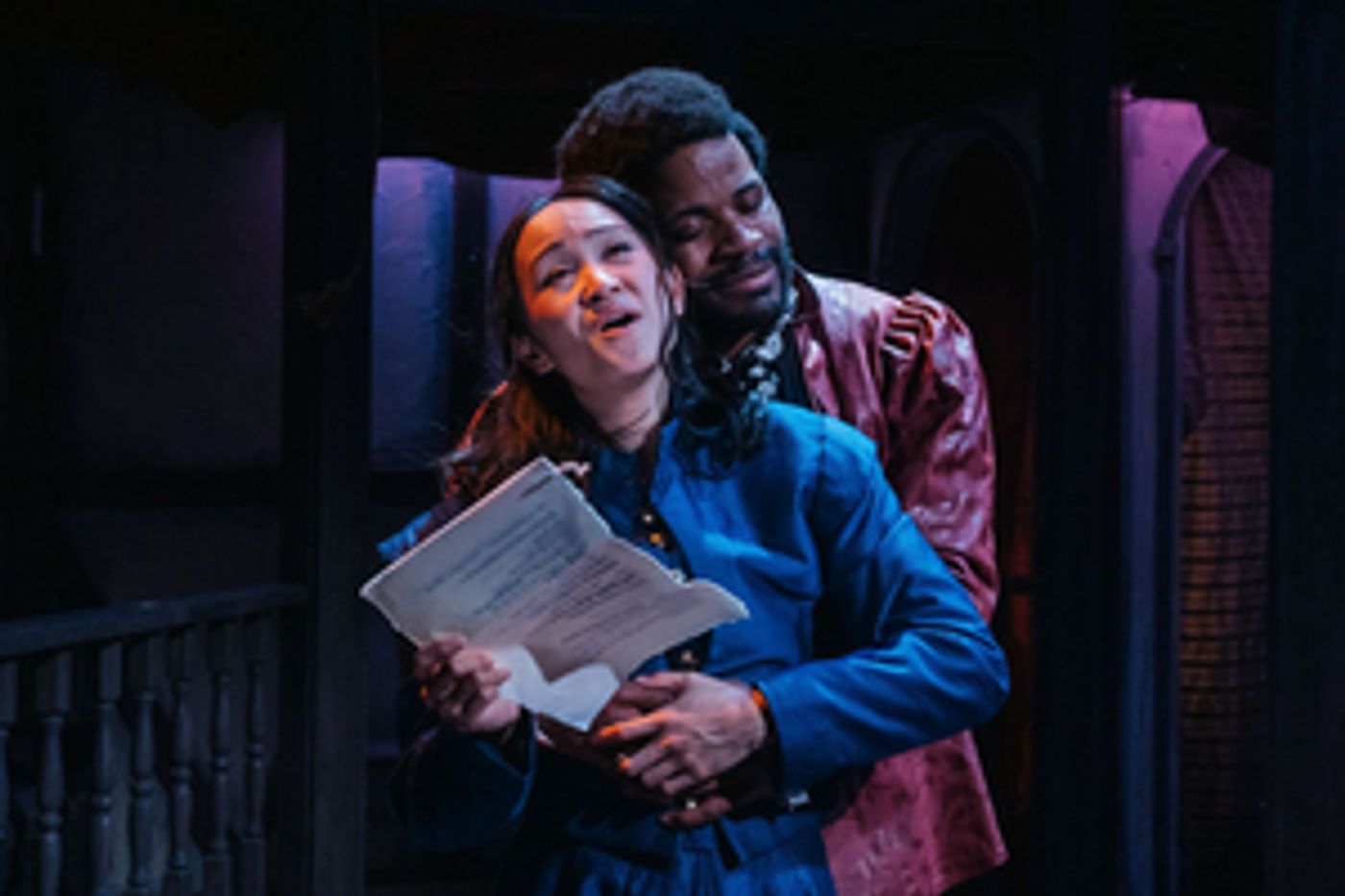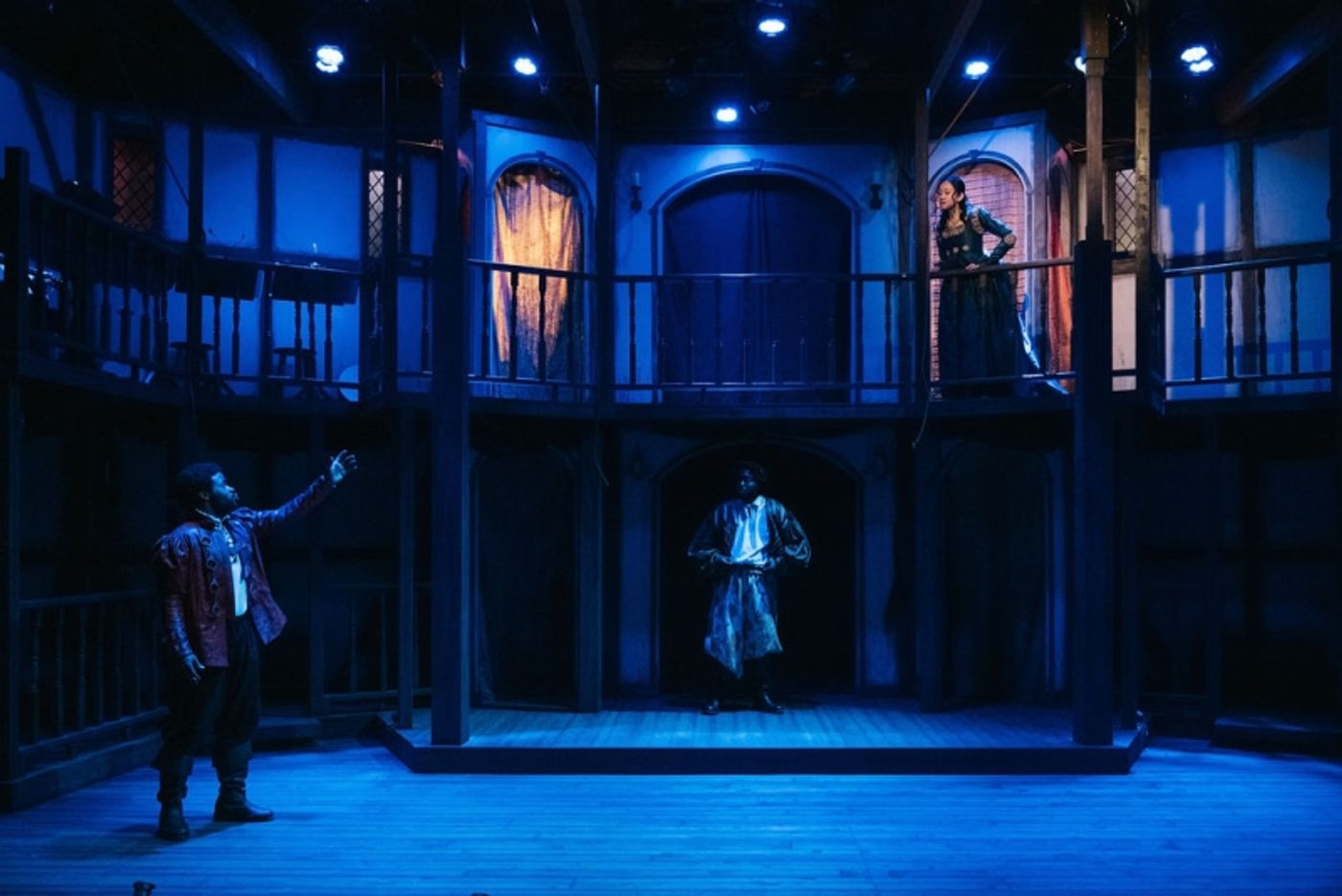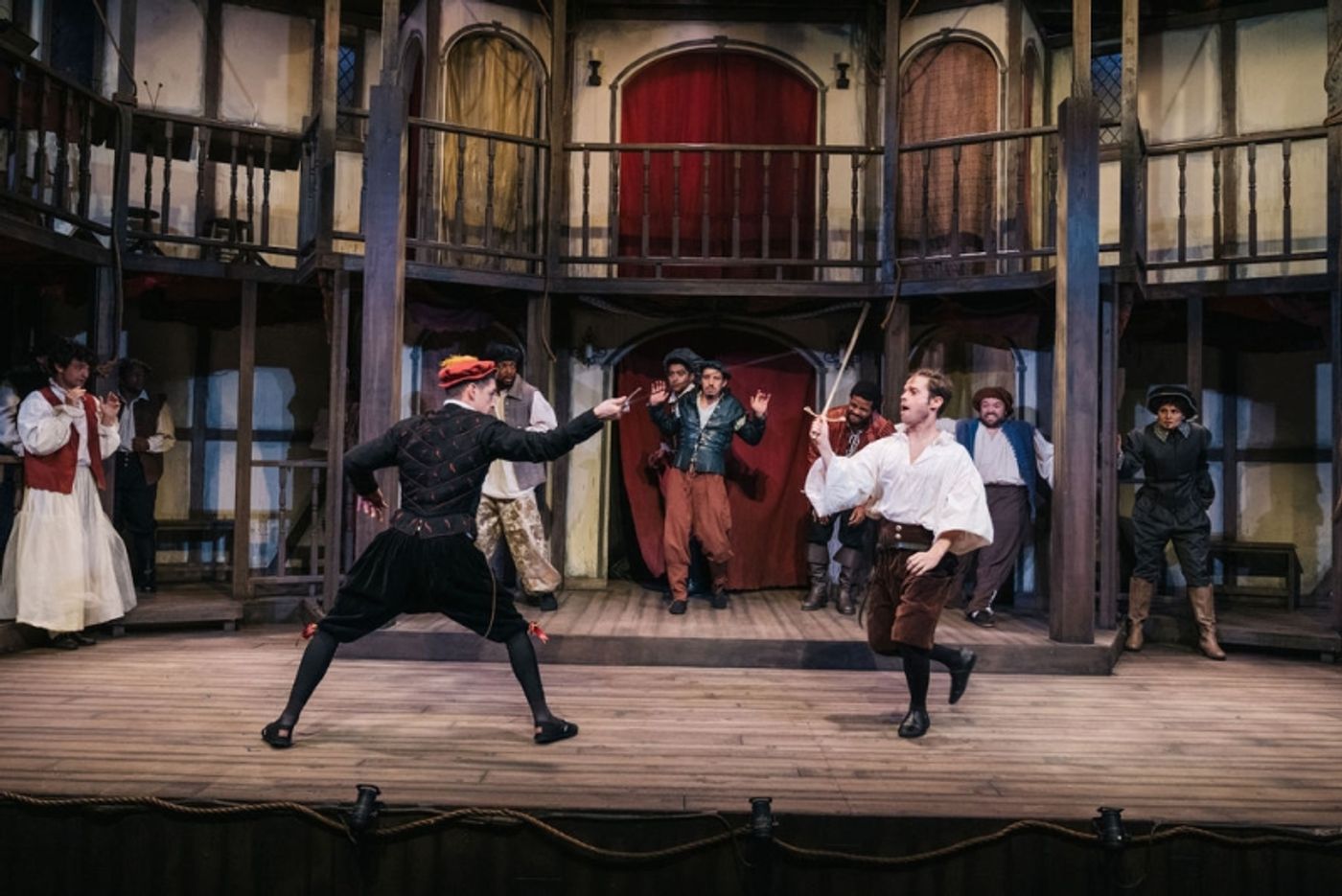Review: SHAKESPEARE IN LOVE at The Keegan Theatre
The regional premiere of Shakespeare in Love plays at The Keegan Theatre through July 16th.

Confession: I've never seen the movie Shakespeare in Love.
Despite the movie's fame - not to mention its Oscar win - and my adoration for literature and love stories, I somehow never was interested in watching it. It's been on my "one day" list for as long as I can remember. So, when the opportunity came up to review the regional premiere of the stage adaptation at The Keegan Theatre, I leapt at the chance to fill in my pop culture gap. Unfortunately, it may be that this production is better-suited for fans of the movie, rather than those of us who hold the history and literature behind it in high esteem.
While the stage adaptation is based on the 1998 movie, it does take a more condensed approach to the plot. Set in 1593, Shakespeare in Love follows William Shakespeare as he struggles to finish a commissioned play for Philip Henslowe, who has in turn promised the play as a means of paying his debts to Hugh Fennyman; incidentally, Shakespeare has also promised the same play to Richard Burbage, who owns a rival theater. Shakespeare's writer's block and struggles to find a muse are exasperated and saved by his close friendship with the great playwright, Christopher "Kit" Marlowe, who essentially ghostwrites for Shakespeare when he's stuck. During auditions for the yet-to-be-written play, Romeo and Ethel, the Pirate's Daughter, Viola de Lesseps, the daughter of a wealthy merchant and a great fan of Shakespeare's Two Gentlemen of Verona, dresses as a man and auditions under the name of Thomas Kent. Shakespeare pursues "Kent" to Viola's home to offer the role of Romeo, then sneaks into her family's party. When Shakespeare dances with Viola (once again dressed as a lady), the two are struck with love, though are caught by Viola's intended, Lord Wessex, who confronts Shakespeare and ejects him from the party. Shakespeare then speaks to Viola from below her balcony, where the two confess their mutual attraction. Inspired by his new "muse," Shakespeare reworks the play to what becomes Romeo and Juliet, building scenes for the central romance based on his interactions with Viola.
Admittedly, part of my struggle with this show is trying to parse out my dislike of the material from my feelings about Keegan's production. The plot tries incredibly hard to create a world in which Shakespeare's Romeo and Juliet is a love story based on real events, despite the fact that it is neither a love story nor factual; in fact, Romeo and Juliet isn't even an original concept by Shakespeare, but an adaptation of an Italian story that was translated to English around thirty years before the play was penned. Furthermore, the assertion that the play is romantic feels more forced than believable, and it's frustrating to see adults behaving like lust-addled teens and accept it as proof of true love - particularly with the specter of Shakespeare's wife, who is only referred to with scathing, dismissive remarks, hanging over the fanciful affair. Like Romeo, Shakespeare takes advantage of a younger, impressionable woman who is wooed by his poetic turn of phrase, and it's hard to look at that situation and see it as anything other than attraction and manipulation.

One main issue with the script is that, while the characters are well-defined, they're not particularly well-developed. The stakes for Shakespeare in particular are pretty low, and most of his conflict is happening around him, rather than to him directly (ie: he promised plays to two theaters, and their subsequent feud is fueled by concerns and motives that are completely independent of him). In fact, despite Will Shakespeare's status as the main character, he's also, quite frankly, the least interesting and a bit insufferable. Much like when I'm watching Romeo and Juliet, I'm most heavily invested in Mercutio/Ned Alleyn and Richard Burbage - the bombastic, flamboyant side character with better lines, a better stage presence, and a much more interesting journey despite only being present for a few scenes. It's hard to invest in the central love story when it feels forced, and even harder when half the main couple feels like a background character in their own tale.
In fairness to the team at The Keegan Theatre, the cast for this production is quite good, though it often felt like the actors were explicitly directed to overact; occasionally, they slipped and acted at a normal level, and their talent was apparent, but the majority of the performance felt forced and overdone. Duane Richards II, as Kit Marlowe, often felt like the steadying voice of reason amongst a plot that felt a bit unstable, and Rebecca Ballinger's Hugh Fennyman was a welcome bit of comic relief, particularly in the second act. Stephen Kime's Sam was a sweet representation of the men who performed as female characters, and Moira Todd was a scene-stealer as the disgruntled John Webster. But the absolute standouts of the show were inarguably Robert Bowen Smith as Richard Burbage and Taylor Witt as Ned Alleyn (who, within the show, is cast as Mercutio); Smith and Witt each played their characters' grandiosity perfectly, and the energy they brought to stage during their confrontation was easily the highlight of the whole production (excepting, of course, Lucas Wookiedog Hartwick's star turn as Spot, the adorable dog inserted into Two Gentlemen because every play should have a dog).

Ryan Sellers' fight choreography, most notably during the aforementioned confrontation, was quite fun to watch. The decision to include an instrumental section on stage, comprised of actors from the performance, was a nice touch, and added a lovely element to the production. However, I was a bit puzzled about the sound mixing - each cast members' individual voices for the musical segments sounded great, but the overall sound of the company as a whole came off as a bit flat, which was a shame, given that the musical interludes were a smart and fitting touch to the performance.
Easily, the best part of the production is the first thing the audience sees: Matthew J. Kennan's set looks like it was plucked directly out of The Globe Theatre - or at least Folger Shakespeare Library here in DC. The two-storied structure was also cleverly used to show actors onstage and backstage during the Romeo and Juliet performance, and the overall authenticity of the set piece helped ground the production. Elizabeth Morton's costumes were also quite good, but occasionally incredibly frustrating - while they were fairly historically accurate and made out of beautiful materials, Viola's gowns consistently were ill-fitted, which was really disappointing and, frankly, confusing, given that everyone else's costumes fit perfectly. I'm also going to be a stickler and say that a white wedding dress has no place in any pre-Victorian Era show - until Queen Victoria (who comes to the throne many generations after Elizabeth I) wore a white gown at her wedding to Prince Albert, people traditionally wore their nicest outfits for their wedding. The white dress is a modern anachronism that was distractingly out of place (though my distraction may have been partly due to the fact that the actress was being swallowed by a dress that fit so poorly).
Overall, Shakespeare in Love may appeal to fans of the movie, but its convoluted plot and awkward presentation make this production one that is unlikely to earn new admirers. It can make for a fun night out, but isn't a production I'd actively recommend prioritizing over others.
The regional premiere of Shakespeare in Love plays at The Keegan Theatre through July 16th. Performance run time is approximately two and a half hours, with one fifteen-minute intermission. Additional information about performances, talkbacks, accessibility, and tickets can be found on The Keegan Theatre's website.
Photo Credits: Cameron Whitman
Reader Reviews
Videos

